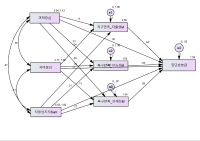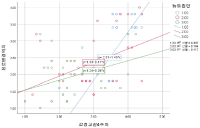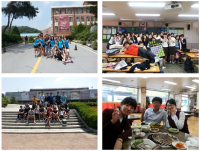
In sport context, the motivational climate created by significant others (e.g., coachs and peers) has been influences on the athletic-student's motivation, engagement, performance, and skill development. Collective efficacy is important for team performance because it influences a group's task choice, effort expenditure, persistence in the face of failure, and resistance to discouragement. This study was to examine the influence of peer motivational climate (i.e., task-involving and ego-involving motivational climate) and coach autonomous support for basic psychological need satisfaction and collective efficacy. In the study, participants were 289 athletic-students' of team sports. In the study then, questionnaire was assessed using by the correlation and path analysis. The results showed that task-involving motivational climate significantly predicted of collective efficacy, while ego-involving motivational climate were negatively predict to the collective efficacy. The results suggest the importance of considering peer influence in addition to coach influence when examining motivational climate in team sport.

The purpose of this study was to examine psychological capital acquisition through Asian Games Participation. 17 of national women football players were completed Psychological Capitals Questionnair. The psychological capital consists of optimism, psychological skills, self-management, collective efficacy, and performance perception was investigated after the team call-ups and before the team-release. The data was analyzed by paired t-test. As results, Korean women football players’ collective efficient and performance perception showed a statistical significance at the beginning of the team call-ups but optimism, psychological skills, and self-direction did not show statistic significances. The team-harmony, interpersonal-management, team-power, sufficient training, trust in coach, efficient communication, and psychological football factors, which were subfactor of football players’ psychological capital, showed statistical significances. However, confidence, concentration, goal-setting, imagery, willpower, anxiety-control, mental-management, life-management, training-management, innate-behavior management, physical-management, football skills, mediative skills, and football intelligence factors did not have statistic significances. These results demonstrate that effects of mega sporting events-like experiences and psychological factors’ variability and inflexibility according to weather changes should be considered when it comes to discussion of psychological factors regarding players’ performance. It is expected that this study would be a fundamental resource for understanding of psychological influences through participations in mega sporting events and discussions about further psychological interventions for teams with environmental consideration as well as methodological developments which could measure effects of the psychological interventions.
PURPOSE This study aimed to apply a team-building program for preparing the national archery team for competition in the Olympics. METHODS To achieve the purpose of this study, six national archers (three men and three women) were included. The team-building program was applied for a total 6 sessions (one session per week). Group cohesion and efficacy were measured three times before, after, and at a later application of the program. The collected data were analyzed with the Friedman and Wilcoxon signed-rank tests, which are nonparametric statistical techniques for data analysis. In addition, an in-depth interview for qualitative data was conducted for each archer to explore the effects and changes resulting from participation in the program. RESULTS The results of the study are as follows: first, the levels of team cohesion and efficacy in the national archery team increased after the implementation of the program compared to those in the pre-implementation state. Furthermore, high levels of team cohesion and efficacy were maintained at the follow-up measurement. Second, the archers recognized that closeness and faith in one another increased more between team members. Furthermore, there were positive changes in team communication, atmosphere, cohesion, and efficacy during team matches. CONCLUSIONS The team-building program applied in this study was found to have a positive effect on various factors related to team cohesion, such as team communication and team atmosphere. Therefore, future studies should consider developing a team-building program that can contribute to improving team sport performance for different sports and the effects of the program should be examined using various methods.

Purpose This study has four objectives. First, the study attempted to see if trainee teachers in PE experienced a higher level of burnout as their experience as trainee teacher accumulated. Second, the current study explored whether female trainee teachers experienced a higher level of burnout than their male counterpart. Third, the study examined whether self-efficacy of trainee teachers had a significant causal relationship on the level of burnout. Forth, the study looked into the possible moderating effect of motivation in the relationship between burnout and intention to change their career path. Methods The data for the study were collected from 112 trainee PE teachers of middle and high schools in Seoul and its vicinity. The data were analyzed with the SPSS statistical package. Results First, the trainee teachers’ level of burnout increased between 2nd week and 4th week and the increase was statistically significant except in the sub-dimension of depersonalization. Second, female trainee teachers showed a higher level of emotional exhaustion than their male counterpart. However, male trainee teachers showed a higher level of diminished personal accomplishment than their female counterpart. Depersonalization did not show any statistical mean difference between male and female groups. Among the four teacher self-efficacy sub-dimensions, only teaching competence showed statistically significant negative influence on emotional exhaustion. Lastly, trainee teachers’ level of motivation worked as a significant moderator in the relationship between emotional exhaustion and intention to change their career path.

PURPOSE This study aimed to apply a capacity building program to sport life skill leaders and to provide cases of this process. METHODS The study participants included four leaders (male=2, female= 2, Mage=37.5) who were managing a sport life skills program at a university. They participated in a capacity building program, which consisted of (a) understanding (leader seminar), (b) application (managing the sport life skills program), and (c) evaluation (leader’s self-reflection), which were conducted in eight sessions. Four leaders conducted self-evaluations using program quality assessment (PQA) during every session, and quantitative and qualitative data were collected. Qualitative data were derived using a cross-case analysis, and quantitative data were used for calculating the effect size after performing the paired t-test. RESULTS Analyzing the reported cases of sport life skill leaders, the use value of the capacity building program was identified. Furthermore, the cases reported by the four leaders enabled observation of how the leader’s capabilities were strengthened. In the paired t-test, the effect size of physical and psychological safety, appropriate structure, supportive relationship, opportunities to belong, support for efficacy mattering, opportunities for life skill building, excluding integration of family, school, and community effort, were all significant. All effect sizes were found to have “very large effects.” CONCLUSIONS The capacity building program played a positive role in strengthening the leaders’ life skill coaching capabilities. These findings have practical implications—chiefly, it is important to strengthen leaders’ or coaches’ capabilities in order to foster life skill development and transfer of student-athletes.

Purpose This study tells about my life about the past time when I studied for the teacher certification examination, using autoethnography. Methods It primarily used personal memories and diaries. The collected data was analyzed by applying longitudinal coding method through technical categories. Results The finding of this study is described in a chronological order as follows. The first part is about my unstable ego formed in my puberty period just like riding a roller coaster. It mainly features the process of choosing a career path when I was in school and the important starting point that made me today. The second part describes about my life after entering the department of physical education. I joined the military only to flee from a fruitless college life where I was wearing an unbefitting mask to hide myself from the world that is completely beyond my control. In the military, I was lucky to realize how to apply my major to set up my career path by coincidence. The third part is about the process of finding a genuine meaning of being a physical education teacher through a transitional period experienced after returning to school and form a stable self. Lastly, passing teacher certification examination with undaunted struggles boosted my self-esteem and self-efficacy and solidified my self-identity in the end. In addition, it is possible to get a glimpse of the attitudes that teachers need to have for a teaching career in the last part. Conclusions What I want to say throughout my descriptive story is that preparing for the teacher certification examination itself is a great challenge as well as a courageous decision for the candidates, but it is an attainable goal if they try with all their heart.

